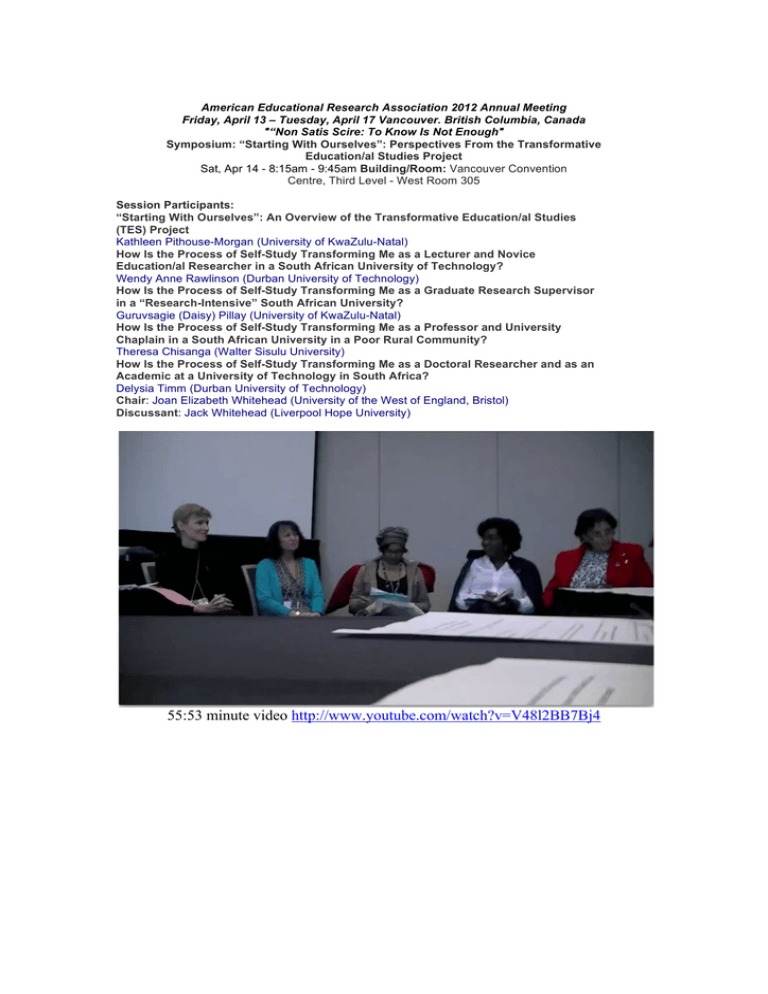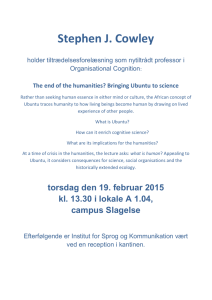55:53 minute video http://www.youtube.com/watch?v=V48l2BB7Bj4
advertisement

American Educational Research Association 2012 Annual Meeting Friday, April 13 – Tuesday, April 17 Vancouver. British Columbia, Canada "“Non Satis Scire: To Know Is Not Enough" Symposium: “Starting With Ourselves”: Perspectives From the Transformative Education/al Studies Project Sat, Apr 14 - 8:15am - 9:45am Building/Room: Vancouver Convention Centre, Third Level - West Room 305 Session Participants: “Starting With Ourselves”: An Overview of the Transformative Education/al Studies (TES) Project Kathleen Pithouse-Morgan (University of KwaZulu-Natal) How Is the Process of Self-Study Transforming Me as a Lecturer and Novice Education/al Researcher in a South African University of Technology? Wendy Anne Rawlinson (Durban University of Technology) How Is the Process of Self-Study Transforming Me as a Graduate Research Supervisor in a “Research-Intensive” South African University? Guruvsagie (Daisy) Pillay (University of KwaZulu-Natal) How Is the Process of Self-Study Transforming Me as a Professor and University Chaplain in a South African University in a Poor Rural Community? Theresa Chisanga (Walter Sisulu University) How Is the Process of Self-Study Transforming Me as a Doctoral Researcher and as an Academic at a University of Technology in South Africa? Delysia Timm (Durban University of Technology) Chair: Joan Elizabeth Whitehead (University of the West of England, Bristol) Discussant: Jack Whitehead (Liverpool Hope University) 55:53 minute video http://www.youtube.com/watch?v=V48l2BB7Bj4 Some reflections on the paper by Liz, Kathleen, Joan and Thenjiwe on Learning from the first year of the Transformative Education/al Studies (TES) project, available online at: http://alternation.ukzn.ac.za/docs/19.2/02%20Har.pdf ). I enjoyed the paper very much and I like the reference to TES participants valuing a range of innovative and creative methods together with the description of how they are able to express their creativity and concerns (p.27) whilst resisting the institutional pressures which arguably 'norm' research (p.29). I believe that there is a significant and highly original contribution to be made by TES about “reflexive ubuntu” as a living standard of judgment for evaluating claims to educational knowledge: The conceptual underpinning of the article is that of reflexive ubuntu, which demands a consciousness of our developing ‘selves’ as researchers and supervisors and of our interrelationships with other people. (p.12) I’m wondering if it might be possible, in a visual narrative, to integrate some of the visual data from the AERA symposium to show embodied meanings of reflexive ubuntu being expressed in practice. Each video-clip below clearly demonstrates to me a simultaneous awareness of the self and others, as well as the values of care and trust in a relational dynamic. Each clip also communicates the expression of a lifeaffirming energy that resonates for me in an Ubuntu way of being and which is very difficult if not impossible to communicate only through a printed-text based medium. Such a visual narrative might enhance and move on the learning in the first year of the project, from reflexive ubuntu being used as a conceptual stance, to showing embodied meanings of reflexive ubuntu being lived out in TES practices. As one example, I’m thinking of the clip (No. 7) of Wendy discussing herself and her responses as a lecturer in the presence of a student spiritual healer. Also, as the focus is on the supervisor relationship, Daisy's (Video-clip No. 6) embodied communications about her relationship to Wendy, as her supervisor, seem to me to express living meanings of reflexive ubuntu. My claim about these living meanings of reflexive ubunta is based on my empathetic resonance with the relational flows of life-affirming energy I feel that the contributors are expressing in their unique singularity within their Ubuntu way of being. I think that the symbol i~we might be useful in grounded the communication of a reflexive ubuntu in a relationship of responsibility towards the other that does not lose the integrity and individuality of the ‘I’. 1) Kathleen Pithouse Morgan,10:43 minutes at http://www.youtube.com/watch?v=FJ6PConcsmU 2) Wendy Rawlinson, Durban University of Technology, 1:47 minutes at http://www.youtube.com/watch?v=ytOQCNpgd9E 3) Guruvsagie (Daisy) Pillay , University of KwaZulu-Natal 2:47 minutes at http://www.youtube.com/watch?v=MKXKadXLimo 4) Theresa Chisanga, Walter Sisulu University, 2:25 minutes at http://www.youtube.com/watch?v=HvAxGae6Wac 5) Delysia Timm, Durban University of Technology 9:09 minutes at http://www.youtube.com/watch?v=cIuRyL4ncHM 6) Wendy Rawlinson, Durban University of Technology, 4:17 minutes http://www.youtube.com/watch?v=qpSjrwpMO0E 7) Guruvsagie (Daisy) Pillay, University of KwaZulu-Natal 11:00 minutes http://www.youtube.com/my_videos?feature=mhee on supervision 8) Jack Whitehead, Liverpool Hope University, 28 seconds at http://www.youtube.com/watch?v=ZkMRxJKroW4
